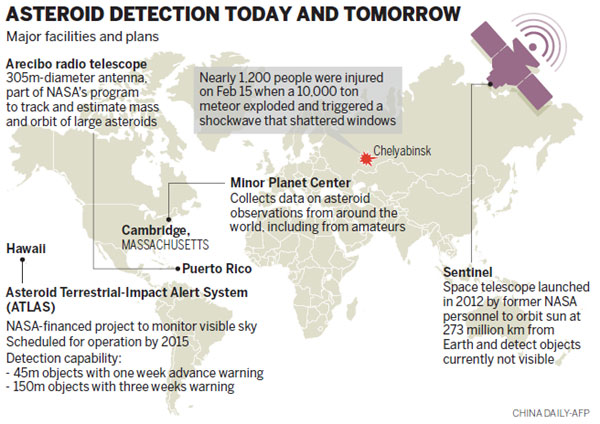NASA to boost meteor defense
 0 Comment(s)
0 Comment(s) Print
Print E-mail Agencies/China Daily, February 20, 2013
E-mail Agencies/China Daily, February 20, 2013
NASA, universities and private groups in the U.S. are working on asteroid warning systems that can detect objects from space like the one that struck Russia last week with a blinding flash and mighty boom.
But the US space agency reiterated that events like the one in the Urals, which shattered windows and injured nearly 1,200 people, are rare.
|
A handout photo taken on Monday shows pieces of porous black rock, reportedly fragments of the meteor that spectacularly plunged over Russia's Ural Mountains, as scientists work on them in a university lab in Yekaterinburg. [Urals Federal University via Agenec France-Presse] |
"We would expect an event of this magnitude to occur once every 100 years on average," said Paul Chodas of NASA's Near-Earth Object Program Office at the Jet Propulsion Laboratory in Pasadena, California.
NASA estimates that before entering Earth's atmosphere above Russia, the asteroid measured 17 meters in diameter and weighed 10,000 tons. Fragments of the asteroid caused an explosion equivalent to 500,000 tons of TNT when they hit.
The same day, an asteroid 45 meters in diameter, known as 2012 DA14, whizzed harmlessly past the Earth, its passage overshadowed by the bright arc drawn across the Russian sky the same day. But had it hit the ground, it could have obliterated a large city.
Ten years ago, NASA would not have been able to detect 2012 DA14, Lindsey Johnson, near-earth object project manager at NASA, said recently. But he said the agency has made progress on learning how to detect small asteroids.
Johnson said there are many of these objects flying around near Earth - say, half a million - and they are hard to track because of their size.








Go to Forum >>0 Comment(s)